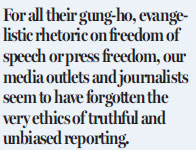HK media is failing to make proper use of its press freedoms
Updated: 2017-01-13 07:05
By Chow Pak-chin(Chow Pak-chin)
|
|||||||||
It's the second week of a new year and the author of this article suspects many will remember that approximately a year ago an application for judicial review was heard in the High Court. The application was filed by a student of the Hong Kong Institute of Education to halt the government's plan to sell a residential site rezoned from greenbelt land in Tai Po. With aid from Green Sense, the 21-year-old, Yau Ka-po, argued that the decision-making process at the Town Planning Board (TPB) was problematic because of inadequate public consultation regarding the said residential site. At the time when Yau's application was first learnt of by the public, Senior Counsel for the Executive Council Mok Shiu-luen already pointed out the illogical aspect of Yau's application for judicial review: The government had conducted consultations on various greenbelt sites, and such consultations had been mentioned in the Policy Addresses from 2013 to 2015. The loss in value for the land, worth HK$5.2 billion, was estimated by Mok at HK$260 million, should the judicial review prevent - or even postpone - the Executive Council's tender invitation for the site.

So what's all the fuss about? The government's plan to turn 70 greenbelt sites, spanning a total of 150 hectares, into sites earmarked for housing is intended to provide an additional 480,000 new homes by 2019 - an ambitious plan to meet the dire housing need. The plans were approved by the TPB on Feb 13 last year. Three months later, Yau applied for another judicial review to overturn the board's decision to endorse the rezoning plans that would see the construction of much-needed flats on five greenbelt sites in Tai Po - Yau's reason being the environmental impact, as one of the five sites is home to over 2,000 trees. It certainly didn't help his case that Secretary for Development Chan Mo-po has reiterated over and over again that the 70 sites take up just 1 percent of the city's entire greenbelt sites, and that most of the targeted sites were de-vegetated and of comparatively lower conservation value anyway.
The result? As announced by the High Court last Friday, Yau has lost his lawsuit against the TPB, and was reprimanded for material non-disclosure despite being in the knowledge of his duty of full and frank disclosure of documents to support his case, and therefore presenting a twisted picture to the court which wrongfully accused the government as having breached a promise never made. Moreover, due to Yau's pursuit of his lawsuit, a whopping HK$1 million in legal aid funds has been spent. If this is not a massive waste of the public coffers, I don't know what it is. But justice has been served, and I shall quote the conclusion made by judge of the Court of First Instance Queeny Au-Yeung: "I find that there was serious material non-disclosure on the part of the applicant. Had there been full and frank disclosure, leave to apply for judicial review in the present case would not have been granted. The applicant has turned a blind eye to the obvious, to say the least. Responsibility was shifted to the TPB and his unidentified lawyers. He should not be allowed to proceed under the guise of wider community interests Alternatively, this judicial review should be dismissed on the ground that continuation of it will amount to abuse of process of the court."

Abuse of process of the court, indeed! Increasingly, we're seeing Hong Kong people taking matters to the court in the name of judicial review while brazenly disregarding their legal duties as applicants in such cases, more often than not disrupting development projects, ultimately incurring colossal financial costs, not to mention opportunity costs in equal measure - as we've also seen in the disputes regarding the Hong Kong-Zhuhai-Macao Bridge, as well as the airport third runway.
But even more baffling is the near-pandemic of biased media coverage of these recent applications for judicial review - media coverage that is selective, and partial to applications for judicial review in the guise of wider community interests. For all their gung-ho, evangelistic rhetoric on freedom of speech or press freedom, our media outlets and journalists seem to have forgotten the very ethics of truthful and unbiased reporting. Should any practitioners in journalism be reading this, here's a bit of "news" from me: In the Human Freedom Index report published by Canada's Fraser Institute on Nov 29, 2016, Hong Kong came in first of the top 10 jurisdictions (followed by Switzerland, New Zealand, Ireland, and Denmark). The index is measured with 79 distinct indicators of personal and economic freedom, including and not limited to "rule of law", "association, assembly, and civil society", and "legal system and property rights". So much press freedom, yet so little utilized prudently to give judicial review applicants like Yau even the slightest slap on the wrist to help society take a bigger leap forward. Isn't it lamentable?